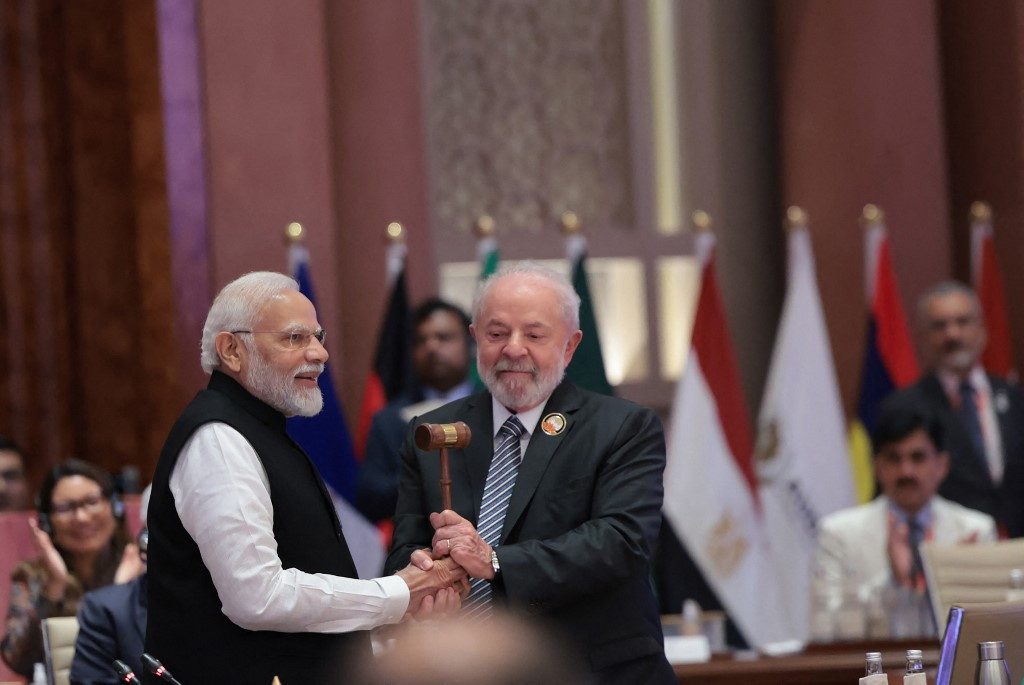Popular Reads
Top Results
Can't find what you're looking for?
View all search resultsPopular Reads
Top Results
Can't find what you're looking for?
View all search resultsReinforcing Indonesia’s G20 priorities
Indonesia’s G20 presidency laid a groundwork by mandating the work of formulating the road map for MDBs’ Capital Adequacy Framework.
Change text size
Gift Premium Articles
to Anyone

In just a few weeks India will formally end its Group of 20 (G20) presidency and pass on the baton to Brazil. Thus far, India claims to have delivered several deliverables. In the Finance Track, this included areas such as climate finance, reform of multilateral development banks (MDBs), global debt vulnerability and other issues.
Looking back, we feel that some of these deliverables were well aligned with Indonesia’s interests, and were continuing the legacy of our presidency’s deliverables last year. Nevertheless, we still need to keep the momentum going and consistently safeguard the discussions as the G20 heads to Brazil.
At the latest summit, President Lula da Silva of Brazil set out clear priorities for Brazil’s presidency. First, social inclusion and the fight against hunger. Second, the energy transition and sustainable development. Third, the reform of global governance institutions. All of these priorities are also on top of Indonesia’s list, and thus, we need to work alongside Brazil in its presidency.
Social inclusion and food security are undoubtedly interrelated. Increasing social inclusion can help improve people's access to the resources and services needed to achieve food security. Vice versa, strong food security can reduce inequality and provide more equitable economic benefits, which in turn can increase social inclusion in Indonesia.
Social inclusion refers to efforts to ensure that all levels of society have equal and fair access to resources, services and opportunities. In Indonesia, social inclusion is important because the country has a diverse population and differences in poverty levels, education and access to basic services. Our social protection budget for next year is planned at around Rp 493.5 trillion (US$32 billion), mainly directed at accelerating the elimination of extreme poverty.
Food security is the ability of a country or community to ensure sufficient, safe and varied access to food for the entire population, at all times. In Indonesia, food security is an important issue due to the large population and complex geographic diversity. Indonesia’s priority in food security is reflected in our planned budget next year of around Rp 108.8 trillion, mainly directed at increasing the availability, access and stability of food prices.
Energy transition and sustainable growth were also major concrete achievements during Indonesia’s G20 presidency last year, and continued during India’s G20 presidency this year, particularly by agreeing on the implementation of the Transition Finance Framework. Brazil’s priorities will continue to maintain this focus on financing the transition by adding more specific, yet comprehensive, aspects including social, economic and environmental issues.
The G20 leaders reiterated the need to realize the commitments made by developed countries toward the goal of jointly mobilizing climate finance of $100 billion per year by 2020 to 2025, to meet the needs of developing countries, including to finance the transition works.
Indonesia itself continues to encourage and gather support for transition activities in line with the conditions in each country, following up last year’s deliverables which succeeded in initiating blended finance, namely the Energy Transition Mechanism (ETM) Country Platform, Just Energy Transition Partnership (JETP) Indonesia and the Global Blended Finance Alliance (GBFA).
In our recent accelerated energy transition strategy to support the achievement of net-zero emissions (NZE) by 2060 or sooner in the electricity sub-sector, at least $250 billion in investment is needed to transition until 2040. Indonesia is ready with the list of projects for the green transition to be funded by international financing.
Also, in alignment with Brazil’s G20 priorities, Indonesia’s Strategic Environmental and Social Assessment (SESA), is an iterative, participatory process to undertake a systematic evaluation of sustainability of options for coal-fired power plant early retirement and renewable energy development.
It aims to ensure that the potential significant environmental and socioeconomic effects and impacts of implementing the ETM in Indonesia are identified and assessed together with measures for their mitigation, and that the results and recommendations are communicated to decision-makers.
The reform of global governance institutions will be closely linked to the continuation of comprehensive efforts by the MDBs to increase their financial capacity to maximize support in addressing various global challenges, including climate change, energy transition, education and health. This larger funding capacity of MDBs will later be beneficial for Indonesia in terms of accessing more funding to support domestic financing needs.
Indonesia’s G20 presidency laid a groundwork by mandating the work of formulating the road map for MDBs’ Capital Adequacy Framework (CAF). This road map expects the MDBs to potentially yield additional lending headroom of approximately $200 billion over the next decade.
The world requires an international development finance system that is fit for purpose, including for the scale of need and depth of the shocks facing developing countries, including the poorest and most vulnerable.
Thus, together, we aim to deliver better, bigger and more effective MDBs.
***
Parjiono is the Group of 20 Indonesia finance deputy, and assistant to the finance minister for macroeconomics and international finance. Chandra Kusuma is the team leader for the G20 and OECD Forum at the Fiscal Policy Agency in the Finance Ministry. The views expressed are their own.










